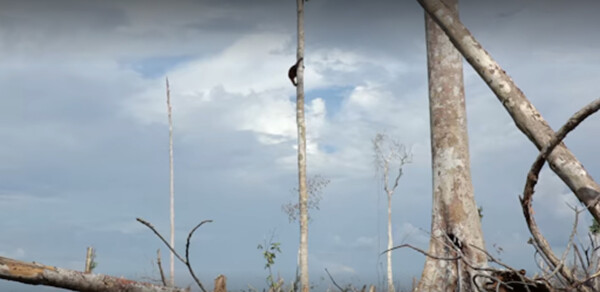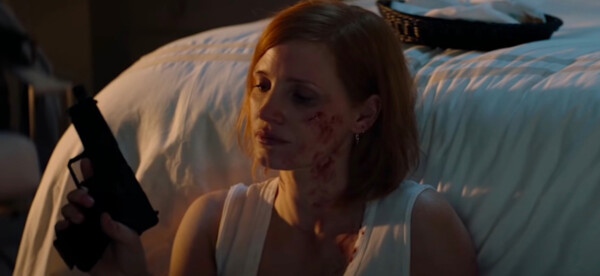Del and Mladen review ‘A Life on Our Planet’

Image courtesy of Silverback Films.
“David Attenborough: A Life on Our Planet” Starring David Attenborough. Directed by Alastair Fothergill, Jonathan Hughes, Keith Scholey. Rated PG. 83 minutes. Netflix.
Del’s take
The most heartbreaking moment in David Attenborough’s profound “A Life on Our Planet” takes place at about the halfway mark when we see an orangutan clinging to the shredded branch of a tree – one tree – remaining in a field of clear-cut Borneo rain forest. Surrounding this pitiful creature lies destruction – jagged stumps, mangled limbs, the earth scarred by monster bulldozers.
Gut-wrenching.
That brief snippet of video perfectly encapsulates the message of Attenborough’s documentary film about the downfall of the natural world and serves as a metaphor for the future of mankind as we greedily attack the systems that make life on Earth possible.
Attenborough has a unique perspective on this tragedy. His role as broadcast journalist and naturalist for the BBC has allowed him to see firsthand the rapid decline in animal species, the fouling of the earth and the collapse of ecosystems. As a result, “A Life on Our Planet” is “my witness statement and my vision for the future,” he says.
The first two thirds of the documentary are devoted to Attenborough’s career as a journalist-naturalist and the chilling litany of ruin and destruction he has witnessed since he began covering the “nature beat” in the 1950s. Then, the plains of Africa were covered with migrating herds of wildebeest and zebras, Antarctica was a deep-freeze of glaciers and penguins, and the oceans of the world were home to thriving coral reefs.
Compare that with today: The great herds of Africa are diminished to a trickle, with some species, like the white rhino, becoming extinct. Glacier coverage around the world has shrunk, contributing to sea level rise and the possible extinction of animals like the emperor penguin. Coral reefs are dying as the oceans heat and become more acidic.
Attenborough tries to describe the relationship that exists between mankind and nature, and how the former must be preserved if latter is to survive, then devotes the remaining third of “A Life on Our Planet” to the steps we must take to save ourselves.
In the end, “We need to learn how to work with nature, not against it,” he says.
The film is a showcase of lush visuals, both beautiful and horrific, the yin and the yang of how beautiful our world once was and could be again, and what it is increasingly becoming.
I expect his “witness statement” will fall on deaf ears.
Forgive my cynicism, but I don’t hold much hope for the years ahead. People are disconnected from nature and cannot understand the gravity of Attenborough’s message. They conflate science with some kind of political philosophy. Any attempt to educate them only hardens their disbelief. Throw in market incentives to maintain the status quo, an unswerving refusal to limit population growth, and a rampant, voracious consumerism stoked by soulless corporate entities and you reach a future that resembles a science fiction novel where masses of uneducated savages are baking in the slums of a dead world, awaiting a final war to finish off the species.
I hope that doesn’t happen. I hope “A Life on Our Planet” creates a groundswell of support for those who are trying to solve the riddles of climate change, population growth and destruction of the natural systems that give us clean water, air to breath and food to eat. I hope to see the weather return to normal, to hear a bobwhite quail calling in the morning, to see moths orbiting the porch light.
In the time it takes you to read this review, 60 average homes’ worth of rain forest will have been cut down. That’s an area roughly the size of your neighborhood, gone forever.
Better hurry.
“A Life on Our Planet” gets an A+.

Mladen’s take
Shit, Del’s correct. By that I mean he correctly assessed the quality and importance of “David Attenborough: A Life on Our Planet” and the documentary’s likely impact on mankind’s environment-ruining behavior, as well as that I hate to admit Del is right about anything.
Attenborough is 93 years old. He walks with a slight hunch and his steps seem tentative, but the sparkle in his eyes, the pleasantness of his voice, and the lucidness of what he observes and says are unchanged. The Old Timer, who narrated such break-through documentaries as “Life on Earth,” “The Living Planet,” and “The Blue Planet,” should be heeded because he knows his stuff. His advice should be taken – reduce poverty to reduce deforestation, destruction of fisheries, obliteration of species; render one-third of the ocean’s littoral off limits to mankind; stopping buying so much crap.
It ain’t gonna happen, of course, as Del notes.
“A Life” makes the argument that mankind will go the way of the wild places it destroys, extinct, unless it starts preserving the atmosphere, the biosphere, and the geosphere. Attenborough’s storytelling is punctuated periodically with a counter that ticks off numbers such as the world population of humans and the percentage of wild places still left from the 1950s to today. Sobering. As the population of people grew, guess what happened to the extent of wild places? I’ll give you a clue. It’s what mathematicians call an inverse relationship.
One striking feature of the documentary might go unnoticed unless you’re paying attention. Attenborough never casts blame for the demise of nature at specific countries or leaders. Bollsanaro in Brazil, the feckless muther-f-er encouraging destruction of the Amazon, is not named. China and brutal, soulless Xi aren’t named for obliterating the country’s rivers. America and beyond-stupid Trump are not named for loosening environment preservation regulations and opening national parks and monuments to “mineral extraction.” Attenborough does use examples of sustainable activity such as agriculture in the Netherlands, if I recall accurately, to make the point mankind can have less impact on the air, land, and water while still enjoying a lofty lifestyle. To Attenborough, the environmental catastrophe facing Earth is caused by “us.” It is “our” problem. The problem can be stemmed only through global action requiring that “we” cooperate with each other.
“A Life” ends where it started, in Pripyat, Ukraine. This “atomgrad” of the former Soviet Union was the place where the people who operated the Chernobyl nuclear power plant lived. When Reactor Number 4 exploded in April 1986, all 50,000 of those people had to be evacuated. The city remains uninhabitable decades later. The radionuclides ejected into the air poisoned some of the world’s most productive land and water, crossing national borders all the way up to parts of North Europe. I assume that Attenborough chose to disregard the March 2011 Fukushima Daiichi three-reactor meltdown in Japan because that disaster is still in the early stages of unfolding.
Attenborough warns us that Earth will become Chernobyl writ planetary scale —uninhabitable for mankind — unless Homo sapiens initiates remediation now. The naturalist considers pollution and climate change significant contributing factors to the destruction of the outdoors, but not its root causes. Industrial agriculture, mining, and fishing; wanton consumerism; and human disconnection from land and sea are the culprits. He asserts we have stepped from nature and into a delusion: that the supply of Earth’s resources is infinite and that are always technologic solutions to problems caused by technology.
To illustrate there’s hope, Attenborough moves from talking about the Chernobyl catastrophe by walking through room after room filled with abandoned furniture, books, and toys to the outdoors. Large fauna (e.g., wolves, deer, and rare wild horses), the kinds of animals that end up dead or displaced when mankind moves in, are reclaiming Pripyat and so are flora. Trees are present in what were once courtyards. They compete for height with the desolate and deteriorating multi-story buildings that once housed tens of thousands of humans. It might be that vines growing up the walls of those buildings are helping them stay intact a little be longer. In Pripyat, it’s as though Nature had forgiven mankind and has started the hard task of re-nourishing the air, land, and water.
So, there it is in a visual nutshell. Attenborough shows that given enough time and space, the outdoors, and, as a consequence, mankind can recover.
“David Attenborough: A Life on Our Planet” gets an A+. Watch this documentary and then go plant a tree in your yard, somewhere, anywhere. Seriously.
Mladen Rudman is a former journalist and technical writer. Del Stone Jr. is a former journalist and author.

Image courtesy of Vertical Entertainment.
“Ava” Starring Jessica Chastain, John Malkovich, Common and others. Directed by Tate Taylor. 96 minutes. Rated R. Netflix.
Mladen’s take
“Ava,” starring Jessica Chastain as a hitwoman, gets good about halfway through the 96-minute movie. What’s the halfway grade on the scale from A to F? Correct. C. That’s the grade the movie gets from me.
Chastain is a very good actress, but what’s with very good actresses heading toward middle-middle to late-middle age and the urge to do action thrillers? We have Angelina Jolie as “Salt.” We have Charlize Theron as the matriarch of “The Old Guard.” Jennifer Garner is “Peppermint.” I imagine you can name others. Are Harrison Ford or Bruce Willis or Liam Neeson convincing as kick-your-ass man killers when they look their skins have turned to leather and their muscles are rippled rather than ripped? I loved the “The Expendables” trilogy, but only Antonio Banderas in TE3 looked somewhat like he was nimble enough to dodge bullets.
Ava is a former drunkard and Army super-soldier recruited by one of her then-commanders – played convincingly by John Malkovich as Duke until he fights and nearly kicks the shit out of much younger Simon (Colin Farrell) – to be the assassinator of guys who’ve done serious wrongs but avoided prison time. Simon is the head of the organization that arranges the hits. Duke and Ava, who are friends, too, are employees of said company.
We are led to believe that in most instances Ava moves in, takes out her target, and moves out with barely a ripple in the Force. But, of late, she’s started asking her marks what they had done that warranted the application of her skills before she applied them. For some reason, Simon is disturbed by Ava’s curiosity.
Between offing prominent baddies, Ava struggles with staying sober, tries to bed her sister’s fiancé (who was once Ava’s lover), and works hard and long to mend relations with her ailing mother, played nicely by Geena Davis. OK, so far so somewhat good, but, like pretty much every action thriller, it seems that very few, if any, other soldiers or mercenaries can shoot as good as our likeable but troubled protagonist. Or fight as good as Ava. Or take body blows like Ava, etc.
But, the real problem with the first half of the film is that it’s somewhat uninteresting because A. I could give a shit about her family woes and B. what’s wrong with knocking off a corrupt IMF economist? It’s when the movie gets personal, Ava moving to avenge Duke’s murder, that I started to enjoy the pretty redhead’s acumen and ability to focus.
“Ava” is a C, but that could be a rating that’s the result of my defective preference for straight-up violence. John Wick started puncturing Russian mobsters with knives and bullets because one of them killed his dog (which his wife gifted after her death) and stole his Mustang. I sympathize with both, though much more with the missing muscle car than a puppy. After that, the dead dog and the stolen hot rod were used by the mobsters to express disbelief about Wick’s motivation to kill them moments before he did so. Wick wanted to be left alone, but people kept interfering with his new life as a non-assassin. Ava, well, she’s portrayed as human. She wants to booze. She wants to copulate. She’s troubled by her mother’s, what, callousness and wants to repair their relationship or obtain her affirmation or whatever. Who cares? Not me, until Ava goes vengeful.
If you want to watch a movie about an assassin and the assassin’s detailed backstory, “Ava” is for you. I prefer my killers to be meticulous, stone-cold sociopaths with contempt for humanity, rather than inclination to become part of it.

Del’s take
Much as it pains me I agree with the drift of Mladen’s review. I wasn’t a fan of “Ava.” Ironically, one of the movie’s co-stars appeared as the lead in a superior action flick many years ago. Oh, if “Ava” had only been half as good.
My problem with “Ava” is that it wants to be two movies – the story of Ava the recovering drunk and the story of Ava the badass lady assassin. For an action movie viewpoint character to have flaws is perfectly fine by me, but when half the movie is spent exploring family dynamics and attending 12-step meetings, the distraction of naval-gazing amounts to more than the focus and pacing can bear.
The movie seemed populated with clichéd characters – John Malkovich as the eccentric yet deadly handler, Colin Farrell as the ruthless higher up and Chastain herself as the out-of-control rogue operative who must be exterminated for the sake of the company’s reputation. All this strikes me as VERY familiar. Maybe if they had changed Ava’s name to “Jason.”
Acting was only so-so. Malkovich is good in everything he does but he typically plays one type of character – the kind of guy who, when you walked into your junior year situational ethics class, could be standing at the podium or slouched in the desk next to you. I’ve never understood the draw of Colin Farrell, who strikes me as a tabula rosa kinda guy, and Common was simply awful. I honestly think Shaquille O’Neal could have done a better job reciting those lines.
And then Chastain … what can I say? She was totally wrong for the part. Most of the time she seemed lost and confused, her face an expressionless slate, her eyes wide with … I don’t know, introspection? Valium? Beats me, but the effect was the same. Plus, and this is a biggie, she totally lacked the physicality to play the role. During many of her fight scenes she struck me as slow, uncoordinated and dare I say weak? I wasn’t convinced.
The one redeeming performance came from Geena Davis as Ava’s bitchy, judgmental mom who’s nevertheless happy to have her kid back home, toxic secrets and all. Davis is an actor’s actor and she seemed born into that role, just as she seemed born into all her roles. She was also the star of a much better action flick that some of you old farts may remember, 1996’s “The Long Kiss Goodnight.” Samantha Caine was the romp ’em, stomp ’em action hero that Ava should have been. If only they had handed Geena a gun.
“Ava” is mostly competent in the details but not so much in the view from 20,000 feet. With a better lead actor and a tightly focused plot it could have been a better movie. From me it gets a C-.
Mladen Rudman is a former journalist and technical writer. Del Stone Jr. is a former journalist and author.